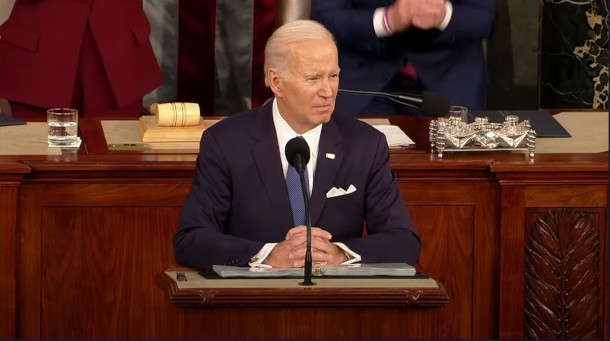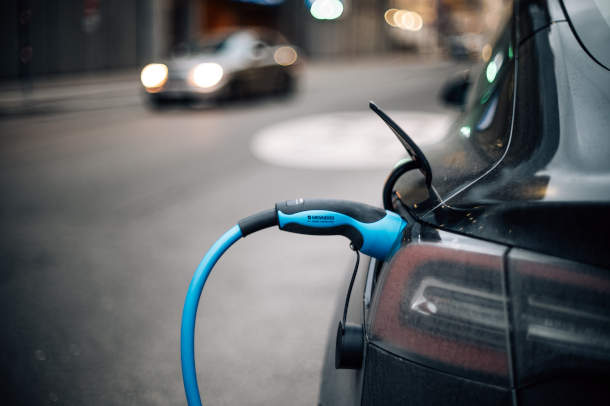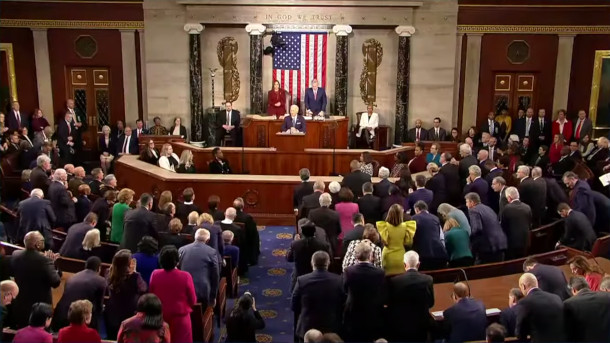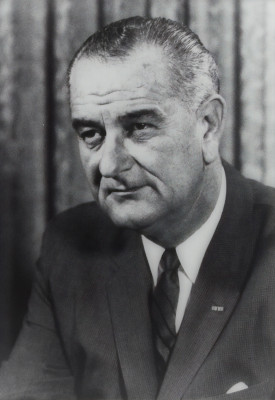Environment & President Biden's State of the Union
Air Date: Week of February 10, 2023

Joseph Robinette Biden Jr., the 46th and current President of the United States and member of the Democratic Party during the State of the Union Address on February 7, 2023. (Photo Screenshot of White House Video, Fair Use)
Though it was not the central theme of his 2023 State of the Union speech, President Biden devoted more time to the environment than previous presidents have in this annual ritual. Commentator Peter Dykstra and Host Steve Curwood discuss President Biden's mentions of climate investments across the United States and an initiative to replace lead pipes that drew bipartisan applause. For history they talk about Lyndon B. Johnson, the first US President to mention climate change in a written addendum to a State of the Union speech.
Transcript
DOERING: It’s Living on Earth. I’m Jenni Doering.
CURWOOD: And I’m Steve Curwood.
And on the line now from Atlanta, Georgia is living on Earth commentator Peter Dykstra to take a look Beyond the Headlines. And, Peter, I think most of the things we talk about on this show were, in fact beyond the headlines a few days ago when the President gave his State of the Union speech.
DYKSTRA: Well Steve, CNN did an interesting thing and they took a stopwatch to the amount of time that President Biden spoke on each of the pressing issues of the day, inflation and the economy and jobs and infrastructure and Ukraine. Climate came in 10th place among those issues, for a grand total of about two minutes worth of discussion.
CURWOOD: That's right, although it's more than we've heard from other presidents in other State of the Union speeches about the environment. Let's take a listen to that section of his speech.
BIDEN: The inflation Reduction Act is also the most significant investment ever in climate change, ever. Lowering utility bills, training American job, leading the world to a clean energy future. I visited the devastating aftermath of record floods, droughts, storms and wildfires from Arizona, New Mexico to all the way up to the Canadian border. More timber has been burned and I've observed from helicopters then the entire state of Missouri and we don't have global warming, not a problem. In addition to emergency recovery from Puerto Rico to Florida to Idaho, we're rebuilding for the long term. New electric grids that are able to weather major storms and not prevent those fire forest fires, roads and water system withstand the next big flood, clean energy to cut pollution and create jobs and communities often left behind. We're gonna build 500,000 electric vehicle charging stations installed across the country by 10s of 1000s IBEW workers. And helping families save more than $1,000 a year with tax credits, to purchase electric vehicles in efficient, efficient appliances, energy efficient appliances. Historic conservation efforts to be responsible stewards of our land, let's face reality. The climate crisis doesn't care if you're in a red or blue state, it's an existential threat. We have an obligation not to ourselves but to our children and grandchildren to confront it. And I'm proud of how, how America at last is stepping up to the challenge. We're still gonna need oil and gas for a while. But guess what? No we do…But there's so much more to do. We got to finish the job. We pay for these investments our future by finally making the wealthiest and biggest corporations begin to pay their fair share. Just begin.

During his second State of the Union speech President Biden mentioned the Bipartisan Infrastructure Law signed in November of 2021 that is meant to fund a national network of electric vehicle charging stations and allocate $7 billion to support the U.S. battery supply chain. (Photo: Ivan Radic. Flickr, CC BY 2.0)
DYKSTRA: Well, it's unusual for a president to go after the oil industry. One exception was back in 2006, when George W. Bush looked at America and Congress and said, we're addicted to oil. Nothing really happened with the oil industry after that. Let's see what happens now with Joe Biden, pledging what sounds like a royal fight over climate change. And not to mention not paying any taxes or very little.
CURWOOD: Yeah, looking oil straight in the eye is I think something of a first here.
DYKSTRA: One of the big issues that was not mentioned that is maybe a lost opportunity is we're looking at a huge and possibly never ending battle to limit plastics in the environment, everywhere from oceans, to atmosphere, to soil, to our own bodies. And of course, plastics are another part of the fossil fuel industry, which even if oil and gas aren't curtailed, that's still part of the petrochemical industry. That's maybe a safety valve for oil and gas to continue. It's a petrochemical product, one of the biggest ones and new oil and gas facilities are being built and structured just to make more plastic.
In his State of the Union address, Pres. Biden reminded lawmakers that ‘the climate crisis doesn’t't care if your state is red or blue. It is an existential threat.’
— NowThis (@nowthisnews) February 9, 2023
While discussing the Inflation Reduction Act, Biden also broke down how the U.S. is preparing for future disasters. pic.twitter.com/ydla6X4IBk
CURWOOD: That's right. He didn't address the plastic debt that we are building up and literally Peter right, because just about every week we ingest a credit cards worth of plastics into our bodies.
DYKSTRA: That's right and that's an appalling thought brought to us by research in the past year or so.
CURWOOD: There were other things that he said though, Peter, what did you notice?
DYKSTRA: Well, talking about lead in drinking water from aging lead pipes, as part of infrastructure, getting rid of all those pipes, mostly in poor urban areas, is something that even speaker Kevin McCarthy seated behind the president along with the Vice President Harris, even Kevin McCarthy applauded that. He obviously didn't applaud a whole lot of other things. But also a few things that maybe there was an opportunity to at least acknowledge and mention, there has been an effort underway by Republicans to gut regulations, including laws like the Endangered Species Act. He could have mentioned more about environmental values in general. But we ended up with those two minutes. And by State of the Union standards, that's a lot.

President Biden speaking of the State of the Union. (Photo Screenshot of White House Video, Fair Use)
CURWOOD: I agree. You know, Peter, there was one thing that in the run up to that speech on February 7th that I found it disturbing. The many major news outlets said the polls show that the President is underwater with the American public, and that he'd have a tough time with this speech. But as I recall, last fall, during the elections, they said that there was going to be this huge red wave. Why should we keep believing these polls that these major news organizations keep trying to sell us?
DYKSTRA: Well, Steve, you're right about the big red wave being a major blunder by pollsters and pundits in the midterm elections. Go back a few years farther to 2016, all of the polls and all of the pundits told us there was no way that America would make Donald Trump its next president.
CURWOOD: I certainly do remember that. Hey, Peter, before you go take a look back in history for us.

President Lyndon B. Johnson (Photo: Library of Congress, Unsplash, public domain)
DYKSTRA: February 8, 1965 that's 58 years ago, in a special message to Congress, which was a written addendum to his State of the Union speech, President Lyndon B. Johnson became the first president to make reference to climate change. He said, quote, "This generation has altered the composition of the atmosphere on a global scale, radioactive materials and a steady increase in carbon dioxide from the burning of fossil fuels.” LBJ said that 58 years ago, and we're still mostly in the talking phase about it.
CURWOOD: What an interesting President, Peter looking back. Lyndon Baines Johnson of course lost his reputation in the Vietnam War, but gave us the Civil Rights Act and was prescient about climate disruption. Who knew... Thanks, Peter, Peter Dykstra is a commentator with living on Earth. We'll talk to you again real soon.
DYKSTRA: Steve. It's been a pleasure. We'll talk to you soon.
CURWOOD: And there's more on these stories on the Living on Earth web page that's loe dot org.
Links
Watch President Biden's State of the Union Address
Read President Biden’s State of the Union Speech
CNN | “Fact-Checking President Biden’s State of the Union Speech”
LBJ’s climate remarks recalled by “Climate Science, 50 Years Later” in Physics Today
Living on Earth wants to hear from you!
Living on Earth
62 Calef Highway, Suite 212
Lee, NH 03861
Telephone: 617-287-4121
E-mail: comments@loe.org
Newsletter [Click here]
Donate to Living on Earth!
Living on Earth is an independent media program and relies entirely on contributions from listeners and institutions supporting public service. Please donate now to preserve an independent environmental voice.
NewsletterLiving on Earth offers a weekly delivery of the show's rundown to your mailbox. Sign up for our newsletter today!
 Sailors For The Sea: Be the change you want to sea.
Sailors For The Sea: Be the change you want to sea.
 The Grantham Foundation for the Protection of the Environment: Committed to protecting and improving the health of the global environment.
The Grantham Foundation for the Protection of the Environment: Committed to protecting and improving the health of the global environment.
 Contribute to Living on Earth and receive, as our gift to you, an archival print of one of Mark Seth Lender's extraordinary wildlife photographs. Follow the link to see Mark's current collection of photographs.
Contribute to Living on Earth and receive, as our gift to you, an archival print of one of Mark Seth Lender's extraordinary wildlife photographs. Follow the link to see Mark's current collection of photographs.
 Buy a signed copy of Mark Seth Lender's book Smeagull the Seagull & support Living on Earth
Buy a signed copy of Mark Seth Lender's book Smeagull the Seagull & support Living on Earth

